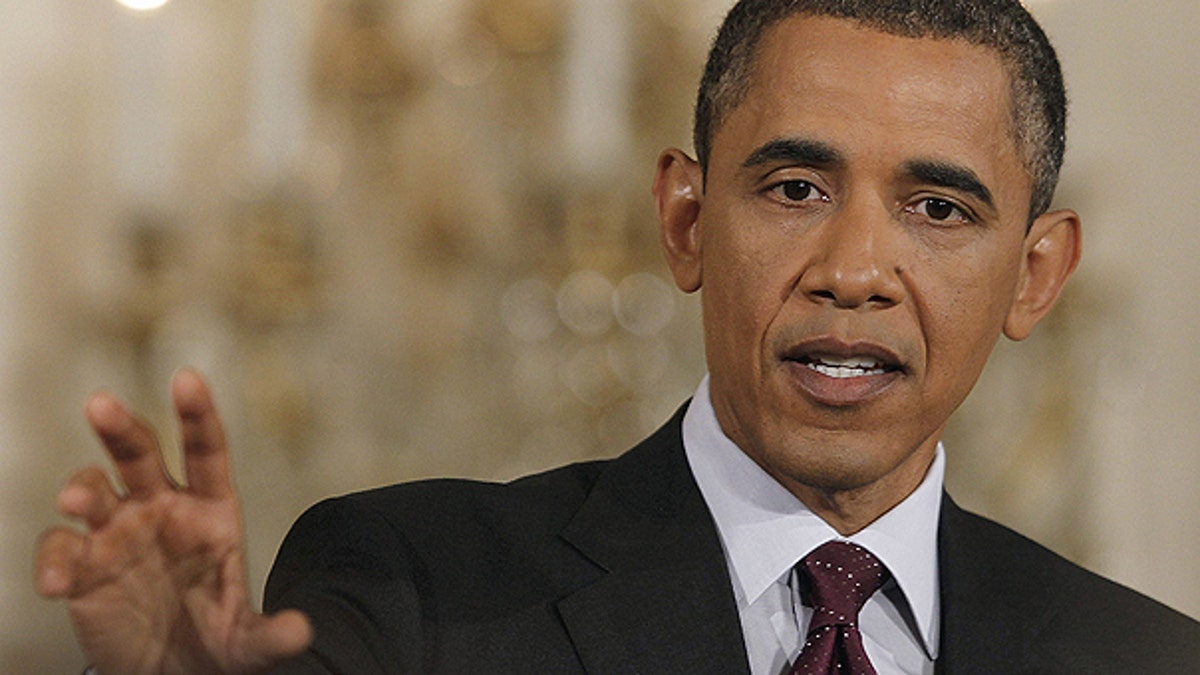
June 29: President Obama gestures during a news conference in the East Room of the White House in Washington. (AP)
WASHINGTON -- In prodding Congress to act swiftly to avoid a government default on its financial obligations, President Obama has Isaac Bassett and a long history of procrastination conspiring against him.
From 1844 until his death in 1895, Bassett, the Senate's stately assistant doorkeeper, would lift a long pole and turn back the hands of the Senate clock at the close of every annual session, lengthening the official day so lawmakers could finish their work within the prescribed time.
Obama on Wednesday insisted there is no more time to add now. And he beseeched and badgered lawmakers to complete a deal to cut long-term deficits and lift the nation's debt ceiling before Aug. 2 to avoid what his administration says would be a calamitous government default.
"There's no point in putting it off," he said. "We've got to get this done."
But neither Obama nor the divided Congress is making it easier. The White House has identified at least $1.3 trillion in spending cuts over 10 years and is proposing up to $400 billion in new tax revenue. Republicans want more spending cuts and no tax increases.
Such brinkmanship relies on the clock; it is both a friend and an adversary. The problem with Aug. 2 is not that it's too soon, but that it's still four week away.
At a news conference Wednesday, the president sought to upend the Republican argument that deficit-cutting negotiations had come to a standstill over the White House desire to increase taxes.
"The tax cuts I'm proposing we get rid of are tax breaks for millionaires and billionaires, tax breaks for oil companies and hedge fund managers, and corporate jet owners," Obama countered.
Ever since bipartisan debt negotiations led by Vice President Joe Biden broke down last week, the White House has gradually become more aggressive, culminating with Obama's spirited news conference.
He called on lawmakers to work through their July Fourth recess. By late Wednesday, the Senate appeared ready to comply. He argued that his 12- and 10-year-old daughters show more discipline getting their work done. "They're not pulling all-nighters," he said.
"Call me naive," he said at another point, "but my expectation is that leaders are going to lead."
Obama is tilting at an institutional dysfunction -- one that he himself once seemed to recognize: "If you don't set deadlines in this town, things don't happen. The default position is inertia," he said in 2009 during the health care debate. As it turned out, his deadline came and went, and it wasn't until 2010 that the health care overhaul legislation passed.
Some deadlines are too stark to avoid, but they get pushed to the brink. The government shutdown talks earlier this year came down to the final two hours. When asked what ultimately led to a deal to avoid halting government operations, one top Obama adviser said, "the clock."
The White House and a lame-duck Congress in late December cut an economic deal mainly for one reason: Without action, tax increases were to kick in on Jan. 1.
"The problem with Congress is it's a big institution, and you have to get a majority of the votes," said Steve Elmendorf, who has observed Congress for years as a top House Democratic leadership aide and now as a lobbyist. "Leaders can make deals with the president, but then leaders have to sell it to the followers. And that usually takes time."
Congressional negotiations are no different than any other high-stakes talks where parties have entrenched positions.
"Each side thinks two things," said congressional scholar Norman Ornstein, co-author of a book on Congress, "The Broken Branch." "One, that it can get more by waiting until the absolute last minute and playing a game of chicken with the other side. The second is that because inevitably there are going to be some concessions on both sides, it's a little bit easier for negotiators to justify that they did everything they could."
The Obama administration is warning that if the debt ceiling is not raised by Aug. 2, the U.S. would face its first default in history, potentially throwing world financial markets into turmoil. Many congressional Republicans aren't convinced, and some administration officials worry that it could take a financial plunge before Congress acts.
It happened before, when the Bush administration tried to persuade Congress to intervene at the height of the financial crisis in 2008. The $700 billion plan to rescue banks was defeated initially in the House in late September 2008, freezing credit markets and sending stock markets into a dive. The measure passed in the ensuing days.
The pending debt ceiling vote would have to raise the current borrowing limit of $14.3 trillion by about $2.4 trillion to last until the end of 2012.
At his news conference, Obama took issue with criticism that he has not pushed for an agreement. He argued that he has spent an hour to an hour-and-a-half each with Republican senators, Democratic senators and House members from both parties.
"I've met with the leaders multiple times," he continued. "At a certain point, they need to do their job."
House Speaker John Boehner, R-Ohio, replied that an increase in the debt ceiling will pass only if the White House agrees to spending cuts in excess of the debt limit increase, holds down future spending and raises no taxes.
"The longer the president denies these realities," Boehner said, "the more difficult he makes this process."
And the longer it will take.
Or, as associate Senate historian Betty Koed put it: "Always it's been this rush at the end of a session to get things done. Somehow it's human nature, and we have human beings in Congress."












































